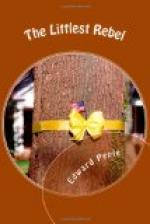For a moment he watched her, proud at least that this proud woman was of his own race, then saw that the old negro, her only protector, still guarded the house.
“Here, old man,” he commanded, “go along with your mistress and take care of her. I’ll be the last to leave and see that nothing happens to the house.”
“Yas, seh. Thank’e, seh,” said old Uncle Billy, coming down. “If all of ’em was only lek you, seh—”
Uncle Billy suddenly turned and looked up at the house, his mouth open in consternation. With a cry of anguish he pointed to an upper window.
“Look what dey done done,” he shrieked. “Aw, Gawd a’mighty! Look what dey done done!”
A cloud of smoke was rolling from the windows, shot through with yellow jets of flame. There was the sound of clumsy boots on the stairs and the door was thrown open. Dudley, escaped from arrest, ran out with a flaming pine torch in his hand.
“Halt!” cried Morrison, with raging anger. “Dudley! HALT!”
But Dudley knew that there would be little use in halting and so ran on until a big revolver barked behind him and he pitched heavily forward on his face. Morrison looked down on the prostrate form and his lips moved sadly, pityingly:
“And I promised her—protection!”
CHAPTER IV
Of all the memories of war, after the dear dead are buried, there is one that serves to bring the struggle back in all the intensity of its horrors—to stand both as a monument to those who bled and suffered and as a lonely sentinel mourning for the peace and plenty of the past—a blackened chimney.
Of all the houses, cabins, barns and cribs which had made up the home of the Carys a few short months ago nothing remained to-day but ashes and black ruin. Only one building had been left unburned and this, before the war, had been the cabin of an overseer. It had but two rooms, and a shallow attic, which was gained by means of an iron ladder reaching to a closely fitting scuttle in the ceiling. The larger room was furnished meagerly with a rough deal table, several common chairs, and a double-doored cupboard against the wall. In the deep, wide fire-place glowed a heap of raked-up embers, on which, suspended from an iron crane, a kettle simmered, sadly, as if in grief for her long-lost brother pots and pans. The plaster on the walls had broken away in patches, especially above the door, where the sunlight streamed through the gaping wound from a cannon shot. The door and window shutters were of heavy oak, swinging inward and fastening with bars; yet now they were open, and through them could be seen a dreary stretch of river bottom, withering beneath the rays of a July sun.
Beyond a distant fringe of trees the muddy James went murmuring down its muddy banks, where the blue cranes waited solemnly for the ebbing tide; where the crows cawed hoarsely in their busy, reeling flight, and the buzzards swung high above the marshes. Yet even in this waste of listless desolation came the echoed boom of heavy guns far down the river, where the “Rebs” and “Yanks” were pounding one another lazily.




